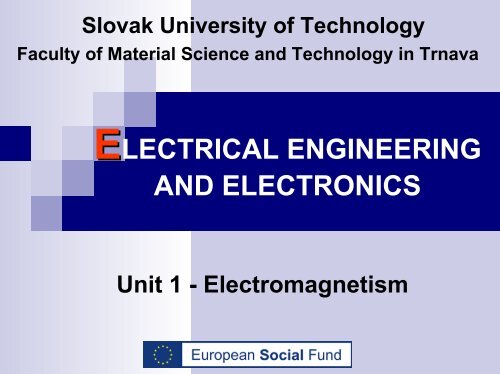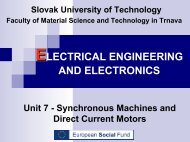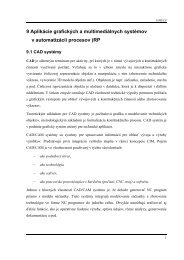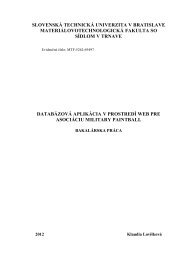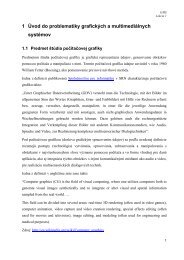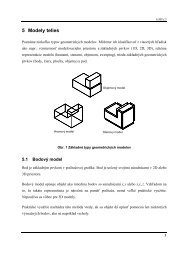ELECTRICAL ENGINEERING AND ELECTRONICS
ELECTRICAL ENGINEERING AND ELECTRONICS
ELECTRICAL ENGINEERING AND ELECTRONICS
You also want an ePaper? Increase the reach of your titles
YUMPU automatically turns print PDFs into web optimized ePapers that Google loves.
Slovak University of Technology<br />
Faculty of Material Science and Technology in Trnava<br />
<strong>ELECTRICAL</strong> <strong>ENGINEERING</strong><br />
<strong>AND</strong> <strong>ELECTRONICS</strong><br />
Unit 1 - Electromagnetism
Course <strong>ELECTRICAL</strong> <strong>ENGINEERING</strong> <strong>AND</strong><br />
<strong>ELECTRONICS</strong><br />
Electromagnetics<br />
Circuit theory<br />
Electrical<br />
measurements<br />
Electrical<br />
machines<br />
Electronics<br />
Converters<br />
and sensors<br />
Power system<br />
protection
Course <strong>ELECTRICAL</strong> <strong>ENGINEERING</strong> <strong>AND</strong><br />
<strong>ELECTRONICS</strong><br />
Electromagnetics<br />
Circuit theory<br />
Electrical<br />
measurements<br />
Electrical<br />
machines<br />
Electronics<br />
Converters<br />
and sensors<br />
• Electric charge<br />
• Electric potential<br />
• Electric current<br />
• Electric power<br />
• Magnetic properties<br />
+ −<br />
B<br />
Power system<br />
protection<br />
H
Course <strong>ELECTRICAL</strong> <strong>ENGINEERING</strong> <strong>AND</strong><br />
<strong>ELECTRONICS</strong><br />
Electromagnetics<br />
Circuit theory<br />
• DC<br />
Electrical<br />
measurements<br />
Electrical<br />
machines<br />
Electronics<br />
Converters<br />
and sensors<br />
•AC<br />
• Alternating Voltages and Currents<br />
• Three phase Circuits<br />
• Impedance<br />
•RLC circuits<br />
U an<br />
U cn<br />
n<br />
U ab<br />
U bn<br />
I b<br />
U ca<br />
Power system<br />
protection<br />
U bc<br />
I c
Course <strong>ELECTRICAL</strong> <strong>ENGINEERING</strong> <strong>AND</strong><br />
<strong>ELECTRONICS</strong><br />
Electromagnetics<br />
Circuit theory<br />
Electrical<br />
measurements<br />
Electrical<br />
machines<br />
Electronics<br />
Converters<br />
and sensors<br />
Power system<br />
protection<br />
classification of instruments<br />
Analog<br />
- Permanent magnet moving coil (PMMC) instruments<br />
- Moving iron (Iron-vane) instruments<br />
- Electrodynamic instruments<br />
- Vibrating reed frequency meter<br />
Digital<br />
- principle of sampling and quantization<br />
- D-A conversion - basic principle<br />
- integrating ADCs<br />
- block schematic diagram of digital instr.
Course <strong>ELECTRICAL</strong> <strong>ENGINEERING</strong> <strong>AND</strong><br />
<strong>ELECTRONICS</strong><br />
Electromagnetics<br />
Circuit theory<br />
Electrical<br />
measurements<br />
Electrical<br />
machines<br />
Electronics<br />
Converters<br />
and sensors<br />
Electrical machines:<br />
transformers<br />
induction machines<br />
DC machines<br />
synchronous machines<br />
special machines<br />
Power system<br />
protection
Course <strong>ELECTRICAL</strong> <strong>ENGINEERING</strong> <strong>AND</strong><br />
<strong>ELECTRONICS</strong><br />
Electromagnetics<br />
Circuit theory<br />
Electrical<br />
measurements<br />
Electrical<br />
machines<br />
Electronics<br />
Electronics<br />
passive elements<br />
diodes<br />
transistors (BJT, FET)<br />
technology IC<br />
Converters<br />
and sensors<br />
Power system<br />
protection
Course <strong>ELECTRICAL</strong> <strong>ENGINEERING</strong> <strong>AND</strong><br />
<strong>ELECTRONICS</strong><br />
Electromagnetics<br />
Converters and sensors<br />
Circuit theory<br />
Electrical<br />
measurements<br />
Electrical<br />
machines<br />
Electronics<br />
Converters<br />
and sensors<br />
Power system<br />
protection<br />
Converters<br />
sensors<br />
P<br />
N<br />
P<br />
N
Course <strong>ELECTRICAL</strong> <strong>ENGINEERING</strong> <strong>AND</strong><br />
<strong>ELECTRONICS</strong><br />
Electromagnetics<br />
Power system protection<br />
Circuit theory<br />
Electrical<br />
measurements<br />
Electrical<br />
machines<br />
• Fuses<br />
• Circuit Breaker<br />
• Safety<br />
Electronics<br />
Converters<br />
and sensors<br />
Power system<br />
protection
Unit 1 - Electromagnetism<br />
• Electricity<br />
From the word “Elektron”<br />
Greek for “amber”<br />
(Demo)
Where do we find electrical circuits?<br />
• Communications<br />
Radio, internet, telephone, television<br />
• Data Processing<br />
Desktop computers, servers<br />
• Automobiles<br />
displays, sensors, motors<br />
• Home<br />
lighting, heating, appliances<br />
• Weather Stations<br />
wind speed, precipitation, temperature<br />
• Power Plants<br />
moving magnets, transformers
Types of Electricity<br />
• Static Electricity - no motion of free<br />
charges<br />
• Current Electricity - motion of free<br />
charges<br />
Direct Current (DC)<br />
Alternating Current (AC)
Voltage<br />
• Voltage is the measure of the potential<br />
to move electrons.<br />
• Sources of Voltage<br />
Batteries (DC)<br />
v ( t ) =<br />
9V<br />
Wall Outlets (AC)<br />
v( t<br />
)<br />
=<br />
110V sin(120πt<br />
)
Power and Energy<br />
• Power - the rate of energy conversion<br />
• Units: Watts<br />
• Equation: p=iv<br />
• Resistors convert electrical energy into<br />
heat energy.<br />
p = iv<br />
p = -iv<br />
Power delivered by a battery<br />
Power dissipated by a resistor
Kirchhoff’s Current Law<br />
• “The net current in a node is zero.”<br />
• For example…
Kirchhoff’s Voltage Law<br />
• “The sum of the voltages in any<br />
closed loop is zero.”
More Circuit Symbols<br />
• DC Voltage Supply<br />
• AC Voltage Supply<br />
• Open Circuit<br />
• Closed Circuit<br />
• Short Circuit<br />
• DC Current Supply<br />
• AC Current Supply
Resistor Equations<br />
• Ohm’s Law: v = iR<br />
• Resistance:<br />
R =<br />
ρL<br />
A<br />
Length in<br />
Meters (m)<br />
Resistance in<br />
Ohms (Ω)<br />
Resistivity in<br />
Ohms-meters (Ω m)<br />
Cross-sectional Area<br />
In square meters (m 2 )
<strong>ELECTRICAL</strong> SYMBOLS
<strong>ELECTRICAL</strong> SYMBOLS
Electromagnetic Spectrum<br />
Visible Spectrum<br />
700 nm 400 nm
Introduction to Electromagnetic<br />
Fields<br />
• Electromagnetics is the study of the effect of<br />
charges at rest and charges in motion.<br />
• Some special cases of electromagnetics:<br />
Electrostatics: charges at rest<br />
Magnetostatics: charges in steady motion (DC)<br />
Electromagnetic waves: waves excited by charges<br />
in time-varying motion
Introduction to Electromagnetic<br />
Fields<br />
Fundamental laws of<br />
classical electromagnetics<br />
Maxwell’s<br />
equations<br />
Special<br />
cases<br />
Electrostatics<br />
Magnetostatics<br />
Electromagnetic<br />
waves<br />
Geometric<br />
Opticscs<br />
Input from<br />
other<br />
disciplines<br />
Statics:<br />
∂<br />
∂t<br />
≡ 0<br />
Circuit<br />
Theory<br />
Transmission<br />
Line<br />
Theory<br />
Kirchoff’s<br />
Laws<br />
d
Introduction to Electromagnetic<br />
Fields<br />
• Fundamental vector field quantities in<br />
electromagnetics:<br />
( E)<br />
Electric field intensity<br />
units = volts per meter (V/m = kg m/A/s 3 )<br />
Electric flux density (electric displacement)<br />
units = coulombs per square meter (C/m 2 = A s /m 2 )<br />
Magnetic field intensity<br />
units = amps per meter (A/m)<br />
Magnetic flux density<br />
( B)<br />
( H )<br />
units = teslas = webers per square meter (T =<br />
Wb/ m 2 = kg/A/s 3 )<br />
( D)


